The Credibility Factor
Credibility in business is one of the key distinguishing characteristics between entrepreneurs who reach success and those who fade into obscurity. You may offer a better product, but if you are known to lack credibility, it will adversely impact your company’s staying power. This is especially true today given the multitude of platforms where news goes viral in a flash.

A company’s credibility is just as important to those within the organization as it is to its consumer base. As Marcus often says, “The customer is not No. 1 to me. They’re No. 2, right behind the employee.” A 2011 study by Elsevier, a leading global research and analytics publication, backs this up. The results of the survey, which canvassed numerous employees of a Fortune 500 company, revealed a positive association between a CEO’s credibility and the organization’s reputation. In addition, the employees’ perception of the organization’s reputation had a positive impact on employee engagement as well.
What is Credibility in Business?
To be credible means that you are believable, reliable and plausible.
Credible individuals possess and nurture a specific set of qualities that earns them a reputation as someone you can trust. A credible organization is the bedrock of an owner-employee and a company-client relationship where all parties are confident that promises will be fulfilled.
Why is it Important that a Business has Credibility?
The link between credibility and an organization’s reputation is exemplified by many Fortune 500 companies. The Walt Disney Company ranked 49 in the list of Fortune 500 companies for 2020. Following a study by Reputation Institute, listed in a Forbes article in 2013, Disney proudly detailed how their organization “…continually strives to earn the respect of consumers, employees and shareholders not only for what we achieve, but also for how we do it.”

Forbes wrote that Reputation Institute, a New York-based global private consulting firm, measured seven dimensions of reputation in the corporate arena, such as citizenship and governance and sought out to identify companies that performed strongly in these areas. “As it turned out, The Walt Disney Company blew everyone else out of the water.” The study pointed out that “reputation is the emotional bond that companies have with stakeholders,” and it is playing an ever-increasing role in driving customers’ decisions.
For the people who depend on you for a product or paycheck, credibility is the beacon of reassurance that your organization merits their investment of time and money. Credibility in business is key in helping your company attract both employees and customers as well as investors. It can also work in your favor when applying for loans, negotiating terms, troubleshooting production issues or requesting an extension on credit.

This “credibility currency,” as coined by Entrepreneur, hinges upon your ability to demonstrate integrity and maintain a trustworthy reputation. People have to be able to trust you. As stated in Inc., “Your trust account is more important than your bank account.”
To be authentic is to be reliable and genuine. Authenticity fosters credibility and will always be a good selling point for your organization. Authenticity also creates a sense of stability because it assures that in troubled waters, you can be relied on to right the ship. As Marcus has said, “It is OK in business, no matter what anybody tells you, to be yourself.”
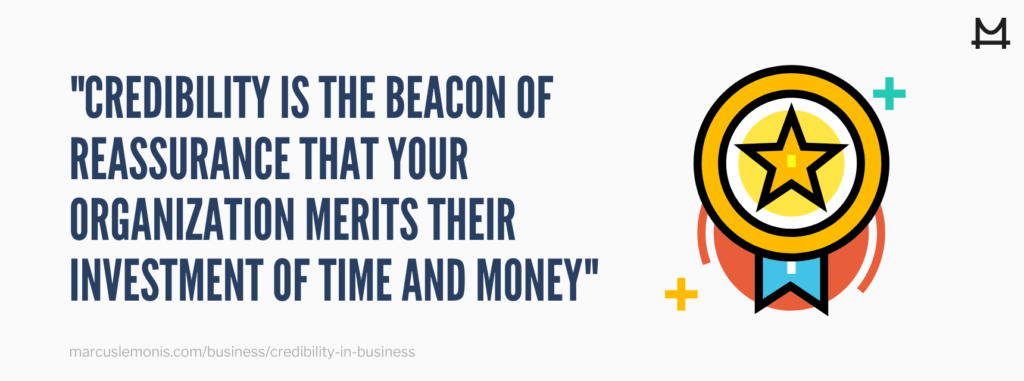
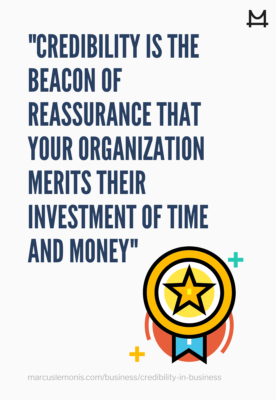
How Do You Establish Credibility in Business?
Establishing credibility in business is a process of practicing consistency, being open and honest, following through on promises and showing your labor is no less than the effort you demand from your employees.

1. Practice Consistency
Consistency can be a challenge for many people. But once you have an established, tried and true procedure or policy in place, it’s important to “Trust the Process” and stick with a path if it’s working. If you operate your business with consistency, both your customers and employees will know what to expect from you and will trust that you’ll do what you say you’re going to do.
When organizations don’t maintain a consistent approach, it can lead to uncertainty and distrust. Understanding the importance of trusting employees and altering behavior consistently to support this was a struggle for a talented artist and owner of a uniquely creative home decor business in New York.
From the beginning, it was clear to Marcus that the owner had trust issues. The company’s Chief of Staff was highly skilled, but the owner had a difficult time giving up control of warehouse management and training. This behavior led to an environment of mistrust and it diverted the owner’s attention away from creating new products.

Marcus set a goal of changing the way the owner thought about his employees and encouraged him to allow his Chief of Staff to run part of the business. The owner reluctantly agreed to turn over inventory management to the Chief of Staff, but he kept slipping back, objecting to her ideas about items selected for removal. Communication broke down and Marcus had to help him understand that the only way the company could move forward is if he consistently trusted the people around him.
The owner finally came to terms with the fact that trust was paramount to a collaborative company culture and the growth of his organization, a milestone critical to consistent behavior change. He gave his Chief of Staff decision-making authority and the ability to take an active role in communication with business partners. This improved credibility with his staff and brightened the company’s financial outlook, as credibility truly comes to fruition only with consistency.
2. Conduct Open and Honest Communications
A significant part of establishing credibility in business is fostering a reputation for communicating with honesty, sincerity and transparency. Internal and external communications from all levels of your organization need to be open and honest, and convey your brand in a consistent manner. Miscommunication, whether it comes from the CEO or other roles, reflects poorly on the whole company.

As Marcus has said, “People respect you more if they get the truth as opposed to a bunch of fluff.”
During a business consultation, Marcus discussed this with the owner of a specialty coffee business on the west coast. The owner had employed a family member to buy and sell coffee beans. The family member had been misrepresenting himself to people outside the company as a Vice President and treated coworkers as though they reported to him. Employee dissatisfaction festered, and no one knew how to deal with it. The family member also demonstrated bias in some of his business partnerships outside of the organization. It became evident that his loyalties did not lie with his employer.
In conversations with Marcus, the owner indicated he had an inkling of what was going on; but he needed leadership support. The owner and Marcus confronted the employee together and replaced him with an experienced professional, which positively impacted the business and employee morale. As a business owner, honest and open communication with your customers and business partners is crucial, and that same level of truthfulness begins from within your organization.
3. Keep Your Promises
Your stewardship to ensure promises are honored even when things go awry will go a long way to build your credibility. Marcus explains, “Things are always going to go wrong. People make mistakes. I know I do. It’s how you resolve it that matters most. Listen, be open to criticism, resolve it with speed and empathy, and take responsibility.”
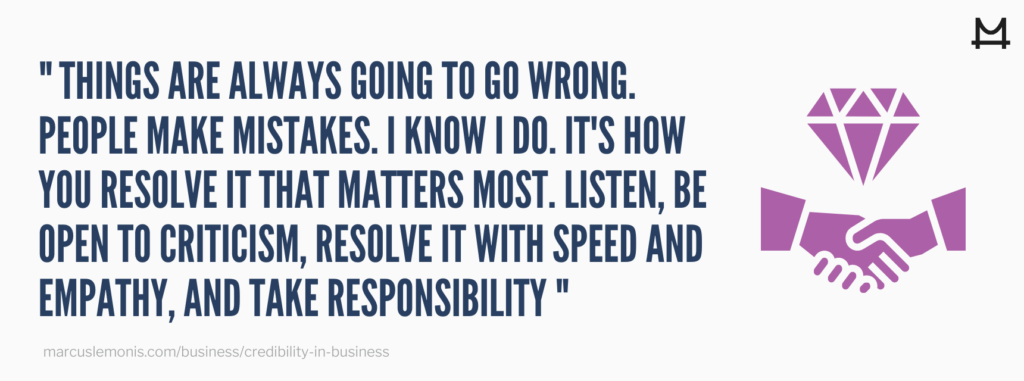
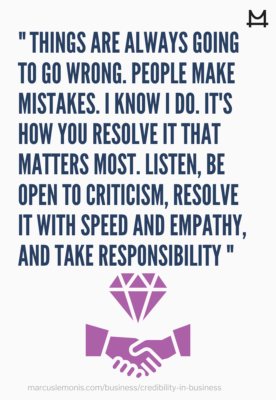
Keeping promises demonstrates respect. In “The Power of Full Engagement,” by Jim Loehr and Tony Schwartz, there is a story of a CEO of a large information services company who believed he treated his employees well; but one criticism received repeatedly was that he was frequently late to meetings. Though he acknowledged the feedback, he didn’t know how to change his behavior and still meet the demands of his role until a consultant made him aware of the connection between promptness and respect. Once it was brought to his attention that his tardiness demonstrated a lack of respect for the attendees kept waiting, he shifted his thinking and found a way to make some adjustments. Disrespect damages credibility in business, and this type of behavior has a way of cascading through the organization in a negative way.

4. Work as Hard as Your People
When you demonstrate your dedication to the company, and your staff sees your efforts to grow the organization, then you serve as a role model and inspiration. They can trust that you are committed. Marcus said, “A successful business owner subscribes to one theory: They show up first, and they leave last.”
The other side of the coin is to have enough faith in your management to delegate authority, so you, as the owner or entrepreneur, can concentrate on other aspects of the enterprise that need your attention.
Marcus explained this to the owner of a fly-fishing boat and apparel company during a consulting project in 2019. The company’s extremely proficient office manager was unable to perform her job functions effectively because of micromanagement from her boss. Not only was this behavior demotivating to her, but it negatively impacted the product development side of the business. The owner of a growing business cannot wear all hats. In this case, the owner was trying to demonstrate his strong work ethic by trying to do everything. Once he gave up some of the control, his office manager was truly able to shine and contribute fully to the organization and he was able to fully concentrate on other aspects of the business.
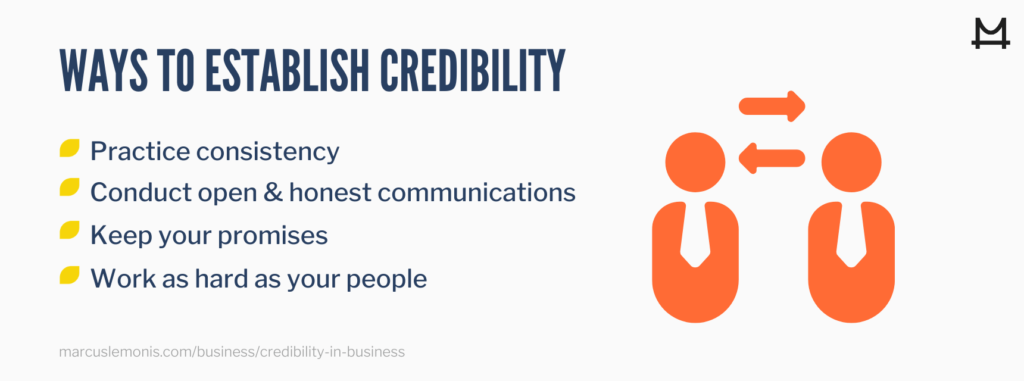
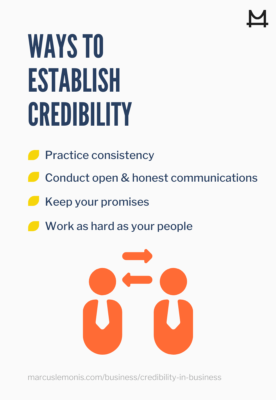
The Bottom Line
At the end of the day, credibility in business feeds your passion. When you put your moral compass on display, you demonstrate respect for your product, your staff, yourself and your customers.
In the words of Marcus Lemonis, “Respect your mom, respect your money, respect your business. Each of them will slap you around if you don’t.”
- What steps have you taken to build credibility for your business?
- Are there any areas you can do better in to improve your credibility?
Businesswire.com. (2020, March 3). New study from Reputation Institute reports across-the-board reputation lift for world’s top 100 brands driven largely by elevated CSR practices. Retrieved from https://www.businesswire.com/news/home/20200303005319/en/New-Study-from-Reputation-Institute-Reports-Across-the-Board-Reputation-Lift-for-World%E2%80%99s-Top-100-Brands-Driven-Largely-By-Elevated-CSR-Practices
Rankingthebrands.com. (n.d.). Global RepTrak 100| 2020. Retrieved from https://www.rankingthebrands.com/The-Brand-Rankings.aspx?rankingID=248&year=1306





